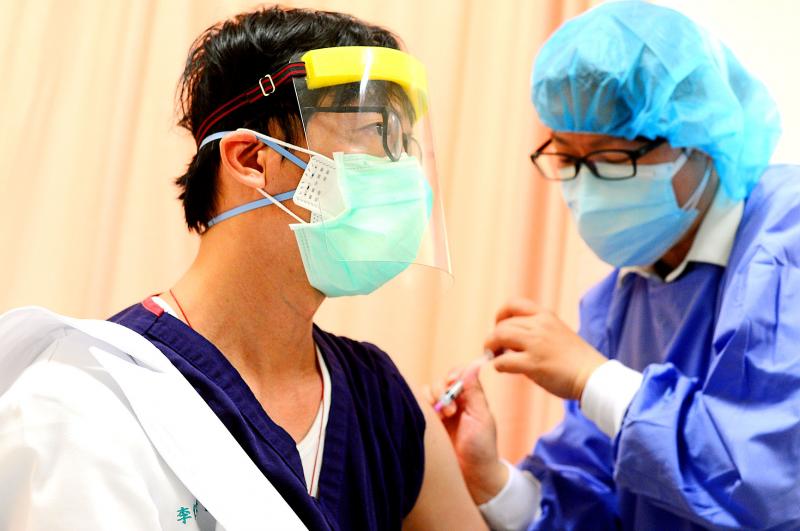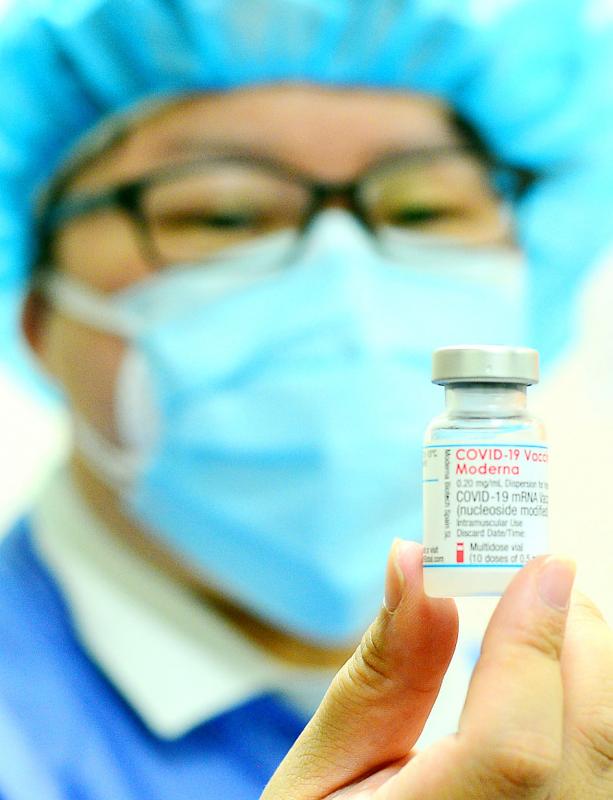People who are allergic to certain foods or medications should still get vaccinated against COVID-19, as most reactions can be treated, a Linkou Chang Gung Memorial Hospital medical expert said on Thursday.
Dermatologist Chung Wen-hung (鐘文宏), who is also director of the Taoyuan hospital’s Drug Hypersensitivity Clinical and Research Center, urged people to get vaccinated as soon as they are allowed to, because the virus is more deadly than vaccine-induced allergic reactions.
Most allergic reactions triggered by vaccines can be treated, Chung said, adding that the hospital has received many inquiries about this issue after the Central Epidemic Command Center (CECC) announced an expanded vaccination program.

Photo: Wang Yi-sung, Taipei Times
From Tuesday next week, people aged 75 or older, residents and staff at long-term care facilities, and people on dialysis are to be eligible for vaccination, the CECC has said.
Currently, only medical personnel, epidemic prevention workers and people in other high-risk jobs are on priority lists.
At least 759,000 COVID-19 vaccine doses had been administered in Taiwan as of Thursday, most of them from AstraZeneca.

Photo: Wang Yi-sung, Taipei Times
So far, Taiwan has reported one case of blood clotting and more than 100 incidents of severe allergic reactions, all of which were related to the AstraZeneca vaccine.
Some people might have an acute allergic reaction, such as hives or shortness of breath, shortly after a jab, while others might get a rash or a more serious response a few days after the injection, Chung said.
However, such symptoms typically subside after treatment, he said.
Taiwanese are more prone to medicine-induced allergic reactions than people from other countries, he said.
Chung did not explain why, but said that allergies to food and medication usually indicate a high sensitivity to external substances.
Chen Wei-ti (陳偉迪), another dermatologist at Linkou Chang Gung Memorial Hospital, said that vaccine-induced allergic reactions are linked to excipients, a substance added to a vaccine as a stabilizer or for other purposes.
Vaccines manufactured by AstraZeneca and Johnson & Johnson contain an excipient called polysorbate, while vaccines developed by Pfizer-BioNTech and Moderna use polyethylene glycol (PEG), Chen said.
The US Centers for Disease Control and Prevention advise people who are allergic to polysorbate to not get AstraZeneca or Johnson & Johnson vaccines, but use brands that use PEG, Chung said.
Similarly, those who are allergic to PEG should not get the Pfizer-BioNTech or Moderna jabs, he cited the US agency as saying.
People should always inform medical personnel of allergies before receiving any vaccine, he said.
Anyone who has an allergic reaction after a first dose should consider a different brand for their second dose, he said.

A decision to describe a Chinese Ministry of Foreign Affairs statement on Singapore’s Taiwan policy as “erroneous” was made because the city-state has its own “one China policy” and has not followed Beijing’s “one China principle,” Deputy Minister of Foreign Affairs Tien Chung-kwang (田中光) said yesterday. It has been a longstanding practice for the People’s Republic of China (PRC) to speak on other countries’ behalf concerning Taiwan, Tien said. The latest example was a statement issued by the PRC after a meeting between Singaporean Prime Minister Lawrence Wong (黃循財) and Chinese President Xi Jinping (習近平) on the sidelines of the APEC summit

Taiwan’s passport ranked 34th in the world, with access to 141 visa-free destinations, according to the latest update to the Henley Passport Index released today. The index put together by Henley & Partners ranks 199 passports globally based on the number of destinations holders can access without a visa out of 227, and is updated monthly. The 141 visa-free destinations for Taiwanese passport holders are a slight decrease from last year, when holders had access to 145 destinations. Botswana and Columbia are among the countries that have recently ended visa-free status for Taiwanese after “bowing to pressure from the Chinese government,” the Ministry

HEALTHCARE: Following a 2022 Constitutional Court ruling, Taiwanese traveling overseas for six months would no longer be able to suspend their insurance Measures allowing people to suspend National Health Insurance (NHI) services if they plan to leave the country for six months would be abolished starting Dec. 23, NHIA Director-General Shih Chung-liang (石崇良) said yesterday. The decision followed the Constitutional Court’s ruling in 2022 that the regulation was unconstitutional and that it would invalidate the regulation automatically unless the NHIA amended it to conform with the Constitution. The agency would amend the regulations to remove the articles and sections that allow the suspension of NHI services, and also introduce provisional clauses for those who suspended their NHI services before Dec. 23, Shih said. According to

‘SIGN OF DANGER’: Beijing has never directly named Taiwanese leaders before, so China is saying that its actions are aimed at the DPP, a foundation official said National Security Bureau (NSB) Director-General Tsai Ming-yen (蔡明彥) yesterday accused Beijing of spreading propaganda, saying that Chinese President Xi Jinping (習近平) had singled out President William Lai (賴清德) in his meeting with US President Joe Biden when talking about those whose “true nature” seek Taiwanese independence. The Biden-Xi meeting took place on the sidelines of the APEC summit in Peru on Saturday. “If the US cares about maintaining peace across the Taiwan Strait, it is crucial that it sees clearly the true nature of Lai and the ruling Democratic Progressive Party (DPP) in seeking Taiwanese independence, handles the Taiwan question with extra